
 Flash News
Flash News
Powerful explosions in Tel Aviv and Jerusalem, Iran attacks with over 100 missiles
Car catches fire in Bulqiza, driver and passengers rescued
Fire in Berat, a bushy area is engulfed in flames
Albanian immigrant pulled them out of the river, the two children couldn't make it out, they suffered clinical death
SPAK would present the bimonthly report on the investigations against Veliaj, the hearing at the GJKKO is postponed
Helsinki Commission: The US must prepare for long-term confrontation with Russia

The United States must prepare for a "long-term" confrontation with Russia that will not end when authoritarian President Vladimir Putin leaves the political scene, a bipartisan commission said in a report. Russia's defeat of Ukraine on the battlefield is essential to victory in the confrontation, and Washington must do everything to ensure that Kiev emerges victorious, the US Helsinki Commission said in a report released on September 30.
The commission, which was established in 1975 to monitor human rights in the Soviet bloc, consists of 18 lawmakers split evenly between the House of Representatives and the Senate, as well as three representatives of the executive branch.
"There will be no hope for a peaceful and stable Russia as long as the state is engaged in war and occupation of its neighbors," the report said.
"The defeat of the Russian invaders from Ukraine is necessary, but not sufficient, not only to force Russia to reflect and reform, but also to root out Russian influence and the broader war of Russian aggression."
The release of the report comes as the future of US military support for Kiev - nearly three years into the war - is unclear as the Republican Party, led by presidential candidate Donald Trump, questions significant financial commitment.
Congress has appropriated $175 billion to support Ukraine since Russia launched its invasion in February 2022. Most of that aid has been spent in the U.S. on arms production and other services. Ukraine will also need a major aid package from the US early next year if it hopes to drive Russian forces from its territory.
Trump, who claims to have a good relationship with Putin, has said that if elected president he will negotiate a quick end to the war. With Russia controlling almost 20 percent of Ukrainian territory, any deal would likely force Kiev to make territorial concessions. And without security guarantees from the US or NATO, there would be no certainty that Putin would not invade again.
Vice President Kamala Harris, the Democratic presidential nominee, supports aid to Ukraine, but it is unclear how much more aid she will provide compared to her current boss, President Joe Biden. His administration has been criticized by supporters of Ukraine for being slow to send aid to Kiev. They argue that he is giving him enough help to survive, but not enough help to win.
Ukrainian President Volodymyr Zelensky was at the White House last week where he presented his "victory" plan to Biden and asked for permission to carry out US missile strikes deeper into Russia. After the meeting, the White House did not announce any policy changes.
The Helsinki Commission report, chaired by Chairman Joe Wilson (Republican from South Carolina), can be seen as an incentive for whichever party wins the presidency and controls the House and Senate next year to continue aid. Wilson is among Republicans, including Sens. Jim Sisch of Idaho and Mitch McConnell of Kentucky, who are staunch supporters of Ukraine.
Putin, who has led Russia for almost a quarter of a century, has tried to justify his invasion by claiming that Ukraine historically belongs to Russia. At the same time, he has tried to rebuild the Kremlin's sphere of influence in the former Soviet space. He has installed people in Russia who share his views to ensure that his policies will continue after he leaves office.
"As long as Russia can count on its imperial history and present, to stop using oppression and corruption as tools for power, to build governing institutions that are based on respect for democracy, human rights and the rule of law, Russia cannot to be a responsible international actor. We must prepare to challenge Russia in the long term," the report said.
The 68-page report also covers parts of Eurasia, from the Western Balkans to Central Asia. As for the Western Balkans, "Russia has exploited internal divisions and by attacking the commitment of the US to hinder the region's integration into Western institutions, including NATO and the EU ," the report said.
"The US should target Russia-linked actors in the region who engage in corruption and destabilizing behavior, and at the same time redouble support for regional security, stability and energy independence" .
Latest news


Poland: A Russian plane violated our airspace!
2025-06-13 21:40:15



Tragedy in Kurbin/ Fire engulfs pig barn, 450 pigs burned alive
2025-06-13 20:40:44
Xixho: Without functional democracy, EU integration remains an illusion!
2025-06-13 20:27:45

UN: Gaza aid group has failed in its mission
2025-06-13 20:04:32

BIRN: Half of Albanians have a gross salary of less than 62 thousand lek!
2025-06-13 19:31:41
Revenge warned/ Iran raises red flag over mosque, consequence of Israeli attacks
2025-06-13 19:23:10
Albanian man killed in metro station, two Englishmen found guilty
2025-06-13 19:08:41
How recommended is a midday nap for health?
2025-06-13 19:01:58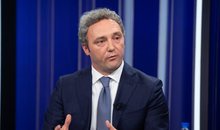

Serious in Italy/ Albanian stabs 23-year-old in Ravenna, escapes on motorcycle
2025-06-13 18:18:57
Car catches fire in Bulqiza, driver and passengers rescued
2025-06-13 17:59:20

Attacks on Iran/ Tirana-Tel Aviv flights canceled, embassy closed
2025-06-13 17:35:45
Apple warns again: Don't sleep with your iPhone while charging!
2025-06-13 17:20:31
Albanian youth raped worker in Greece, surrenders to police (NAME)
2025-06-13 16:59:50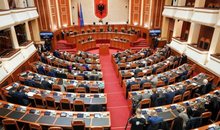
Plenary session in the Parliament on Monday, what will be discussed?
2025-06-13 16:42:10


Fire in Berat, a bushy area is engulfed in flames
2025-06-13 16:06:18
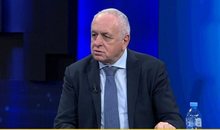
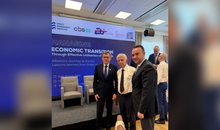

Israeli attacks, Trump calls on Iran: A deal must be made, before it's too late
2025-06-13 15:19:21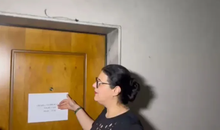

Israel's attacks on Iran raise oil prices worldwide
2025-06-13 14:56:37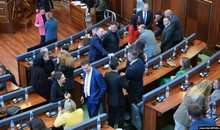
The Kosovo Assembly is not constituted even in the 31st attempt
2025-06-13 14:41:24
Euro hits 'bottom', European currency drops to new historic low
2025-06-13 14:30:28
First outbreak of small cattle plague confirmed in Korça
2025-06-13 14:19:51
Kiara Tito "in mourning", experiences great pain: I will always miss your voice
2025-06-13 14:13:47
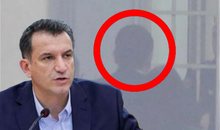

Trump warns Iran to accept nuclear deal before 'even more brutal' attacks
2025-06-13 13:55:25
Iran appoints new commanders after Israel kills military leaders
2025-06-13 13:39:28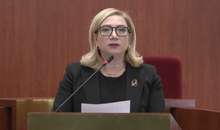

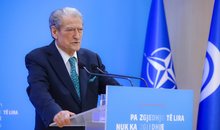

Maliq farmers protest
2025-06-13 13:03:07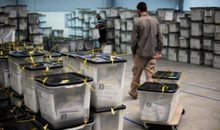
KAS accepts the DP's request, decides to recount the votes in Gramsh and Peqin
2025-06-13 12:46:14



Bennett who sealed the political "deflowering" of SPAK
2025-06-13 12:21:27
Lied to FBI about Charles McGonigal's connections, Former Diplomat Pleads Guilty
2025-06-13 12:10:56
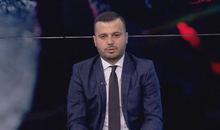
The strange world of justice
2025-06-13 11:55:10
SPAK reports today to the GJKKO the two-month investigation into Erion Veliaj
2025-06-13 11:39:30

40-year-old arrested for stealing hospital employees' bags
2025-06-13 11:21:09


Tabaku: We cannot behave like Europeans in Brussels and like autocrats in Tirana
2025-06-13 10:49:00
International Atomic Energy Agency: Iran's main nuclear plants not hit
2025-06-13 10:36:12
AMP punishes three "Eagles" officers, suspends them from duty
2025-06-13 10:28:13
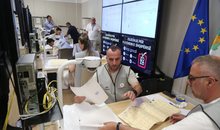

Flights in the Middle East canceled after Israeli airstrikes on Iran
2025-06-13 09:53:02
Halit Valteri appears in SPAK, why was he summoned?
2025-06-13 09:39:50
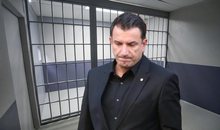

These Horoscope Signs Will Have Lots of Luck During the Summer
2025-06-13 09:13:00



What are Iran's nuclear ambitions and why are they so controversial?
2025-06-13 08:38:03
Donald Trump convenes cabinet after Israeli attacks on Iran
2025-06-13 08:24:44
Foreign exchange, the rate at which foreign currencies are sold and bought
2025-06-13 08:16:58
Albanian investments abroad slowed down in the first quarter of the year
2025-06-13 08:06:34
Çfarë ndodh në organizëm nëse hani një thelpi hudhër në darkë
2025-06-13 08:00:48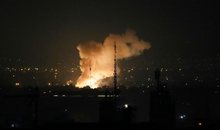
Israel attacks Iran, targets nuclear plants and military commanders
2025-06-13 07:46:14
Temperatures up to 36 degrees, as the weather forecast for today
2025-06-13 07:33:10
Horoscope June 13, 2025, what the stars predict
2025-06-13 07:15:37
Morning Post/ In 2 lines: What mattered yesterday in Albania
2025-06-13 06:59:27
Car goes off the road on the "Tirana-Lezha" axis, 4 injured
2025-06-12 23:03:47
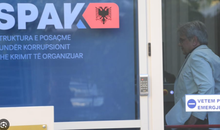
Document/ Benet Beci was taken into custody by SPAK before the elections
2025-06-12 22:52:12



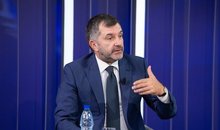




Montenegrin Army to train Ukrainian soldiers
2025-06-12 20:13:45
Italia në alarm, zgjebja po përhapet me shpejtësi
2025-06-12 20:11:39

Dua Lipa gets engaged: I'm happier than ever with Callum Turner
2025-06-12 19:44:29

Around 29,000 Albanians left last year, INSTAT estimates
2025-06-12 19:31:23

Rama "sacrifices" the socialists to make fun of Soros
2025-06-12 19:13:33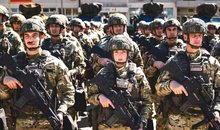
Montenegrin Army to participate in EU military assistance mission to Ukraine
2025-06-12 18:57:36

